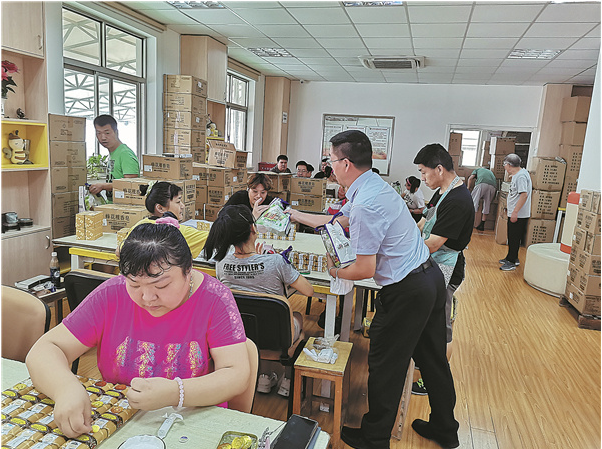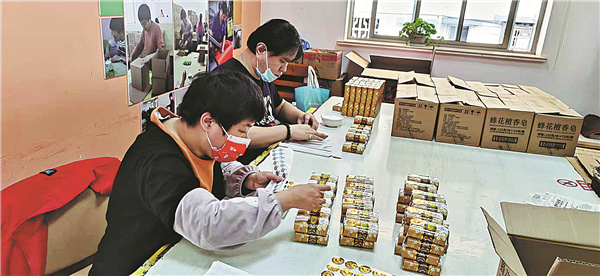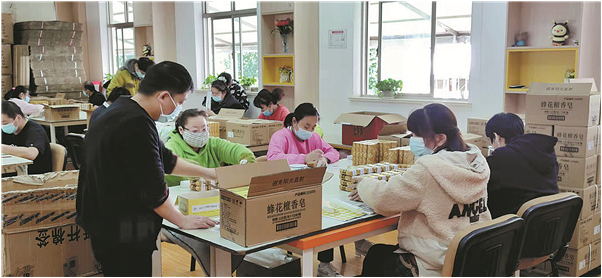It was marketed with the help of movie stars and celebrities in the 1930s, and its makers have long vaunted the 60 kinds of raw materials that go into its production, its special scent and its efficacy, and the fact that it is individually and manually packaged.
This is Bee & Flower, an old soap brand in Shanghai founded in 1928. Little has changed in the way it has been packaged in all those years, and it has a string of accolades to its name, including national awards for soap, being the first soap in China to be exported, in 1933, and having on that export list the names of no less than 40 countries.
But behind those figures and accolades is another outstanding feature, and something few of its buyers may know: in more recent years their purchase has helped those with intellectual disabilities.
The packaging includes seven different materials and nine processes, including grease paper, cardboard, instructions and trademarks, but, perhaps most importantly, it is all wrapped by hand, says Wang Zhenming, general manager of Shanghai Soap, the cleaning products company that owns Bee& Flower.
Since 2007, with the support of the disabled persons' federation of Yangpu district of Shanghai, the company has run a community manual packaging project in what are called sunshine homes that are designed to help those with intellectual disabilities in training and to build work skills.
The original aim was to lift some of the pressure from families faced with the highly taxing task of looking after the disabled, Wang says, and at the same time give the disabled interesting activities that would help them both physically and mentally, including with work skills.

The community manual packaging project is designed to help those with intellectual disabilities in training and to build work skills. [Photo provided to China Daily]
"So our soap packaging project was chosen because the soap is environmentally friendly, and is so safe that even if someone ingests some of the soap accidentally, no harm is caused."
The project was started in the sunshine home in the Yinhang area and has expanded to six sunshine homes in Yangpu district, in the areas of Daqiao, Dinghai, Pingliang, Siping, Wujiaochang and Yanji, with a total of nearly 500 workers.
After preliminary training which lasts a month on average, these workers are responsible for different parts of the packaging.
"Students are paid 4 yuan (0.63 cents) for each bar of soap they package, half of that paid by the company and the rest by the government," Wang says."On average they're paid more than 1,000 yuan a month."
Wang Weiliang, a member of staff in the Yanji home, says that originally employees there could manage only one or two boxes a day, but thanks to experience gained over 10 years, they can now handle 50 to 60 boxes a day.

The packaging includes seven different materials and nine processes, including grease paper, cardboard, instructions and trademarks. [Photo provided to China Daily]
The company produces about 7,000 tons of soap a day, 80 percent of that by sunshine home employees, and the rest by employees on company premises, Wang says.
There was even a shortage of soap when COVID-19 broke out because sunshine homes were closed, he says.
"Many people with disabilities stay at home after graduating from special education schools and have no chance to work or have contact with society. This project allows them to do paid work and make friends so that they will become healthier both physically and mentally, and provide the greatest help to their families.
"Several employees have even married after meeting in a sunshine home."
Chen Lei, 38, with severe intellectual impairment, started working in a sunshine home in 2005, and his bodily coordination has significantly improved since he started wrapping soap in 2009, Wang says.
Having soap packaged manually increases production costs by about 10 percent above what they would be if the process was automated, Wang says.

The packaging includes seven different materials and nine processes, including grease paper, cardboard, instructions and trademarks. [Photo provided to China Daily]
"A machine could make the soap and package it at one time. Having the packaging done separately in the sunshine homes incurs transport costs and adds two months to the manufacturing process.
"In addition, the company cannot require the sunshine home workers to guarantee quantity, so output can be unstable.
"But it's hard for anyone else to provide this job opportunity and at the same time make a terrific contribution to society, and I hope we can continue to do this for a long time to come."
The company may establish other product lines for the sunshine employees to wrap, he says.
Lu Yung-Pin, assistant professor in the School of International and Public Affairs at Shanghai Jiao Tong University, who is also a researcher for Social Organization and Contraction of the State Civil Society Organization, says:"This project will encourage more companies and social services not just to donate money, but to find a sustainable model that can produce social benefits.
"It also makes society more aware of this special group of people and provides them with support. In addition, apart from inspiring other companies and consumers, the project itself is a good way to publicize corporate culture."

